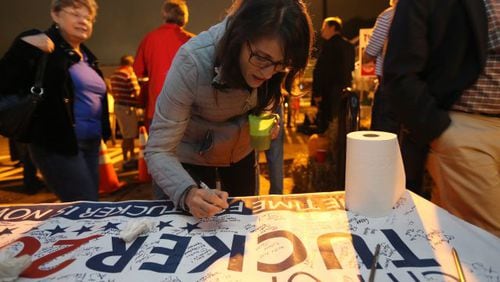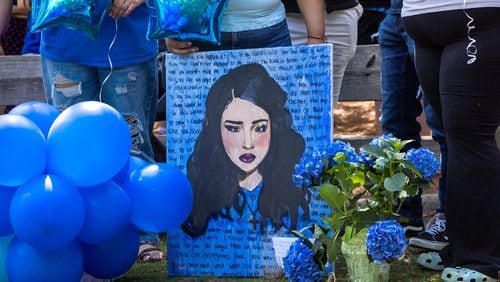Metro Atlanta cityhood votes
Sandy Springs (2005) … 94%
Milton (2006) … 86%
Johns Creek (2006) … 84%
Chattahoochee Hills (2007) … 84%
South Fulton (2007) … 15%
Dunwoody (2008) … 81%
Peachtree Corners (2011) … 57%
Brookhaven (2012) … 55%
Tucker (2015) … 74%
LaVista Hills (2015) … 49.5%
Source: County Election Offices.
Voter motivations on cityhood vote
Supporters
- Local control
- Closer representation
- DeKalb corruption
Opponents
- Cost to taxpayers
- Additional government
- Desire to remain unincorporated
In a referendum on the identity of two communities, voters in Tucker embraced cityhood for their well-known suburb while residents narrowly opposed the concept in LaVista Hills, a region named less than a year ago.
The election was a split decision for Metro Atlanta's incorporation movement, with Tucker winning approval by a 3-to-1 margin and LaVista Hills falling short by 136 votes — 1 percent of votes cast.
LaVista Hills was the first city proposal to fail since voters overwhelming rejected South Fulton in 2007.
Meanwhile, Tucker and seven other cities have now been created since Sandy Springs started the incorporation trend in 2005.
Tucker, an unincorporated region for more than 120 years, won cityhood with the argument that residents needed their own local government to protect their community. Supporters of Tucker feared that nearby cities or LaVista Hills would take over their territory if they didn’t seek to become a municipality themselves.
“We want to be in control of our future,” said Michelle Penkava, a leader of Tucker 2015. “We want to make sure that all the generations of work that have been done in Tucker isn’t lost and that our community isn’t fractured.”
Following voters’ decision against forming LaVista Hills, the region from outside Emory University to the eastern edge of I-285 could now be assimilated into surrounding cities. Atlanta, Brookhaven, Chamblee, Doraville or Tucker may attempt annexations.
“I firmly believe this was the last opportunity for a new city created by the citizens,” said Mary Kay Woodworth, president of the LaVista Hills Alliance. “Ultimately all the county, and first of all this area, from the Gwinnett County line down to the city of Atlanta, will be ripe for picking.”
LaVista Hills lost in large part because of opposition from voters who live near the Toco Hill shopping center and along the major thoroughfares of North Druid Hills and Clairmont Roads. Six separate precincts opposed incorporation by a wider margin than the ultimate 136-vote difference in the outcome.
Residents opposing LaVista Hills said they were concerned about the cost of a new city, the perils of starting up a new government and the impact on DeKalb County.
“I think we should give DeKalb County another try and not add another layer of government,” said Renee Underwood after voting at Lakeside High on Tuesday. “Let’s work on improving what we have.”
Supporters of LaVista Hills said they wanted more local control and a degree of separation from the county, which has been dealing with corruption allegations and several criminal prosecutions of elected officials.
“It’s time to clean the county a little bit. LaVista Hills can’t do much worse,” said Jennings Watkins after casting his ballot.
Cityhood movement won’t fade
Voters who didn’t want a city of LaVista Hills appeared motivated to show up at the polls Tuesday, according to turnout figures.
About 40 percent of registered voters participated in the LaVista Hills’ unsuccessful referendum, and 31 percent voted in Tucker’s winning referendum. Only voters within each area were eligible to cast ballots on the cityhood questions.
“I do get the sense that a lot of the turnout yesterday was driven by the people who were going to refuse to be in LaVista Hills,” said Michael Leo Owens, an Emory University political science professor who teaches urban politics. “My sense is that cityhood is going to be more difficult moving forward.”
Owens, who lives in the LaVista Hills area and opposed the cityhood effort, said residents were disgusted by daily robocalls and divisive political mailers from cityhood proponents.
The heated campaign also included calls and fliers from cityhood critics, an organized effort that damaged LaVista Hills’ chances, said Allen Venet, the president of LaVista Hills Yes.
"A lot of people probably voted no because of misunderstandings or mistaken beliefs about taxes going up," Venet said. "I have little doubt that there will be annexation efforts that will attempt to whittle away property that we were calling LaVista Hills."
Even if the LaVista Hills concept fades away, the cityhood movement in other areas won't. Various communities are considering incorporation, including Stonecrest, South Fulton, Greenhaven in South DeKalb, Sharon Springs in Forsyth County and St. Simons Island.
As for Tucker, it plans to hold its first municipal elections March 1 and then begin doing business by mid-summer, Penkava said.
Tucker will have a small government taking over a handful of services from the county, including parks and recreation, code enforcement and planning and zoning. Its population of 33,000 residents will continue to be served by county police.







